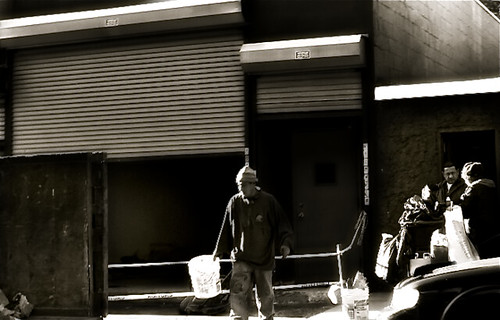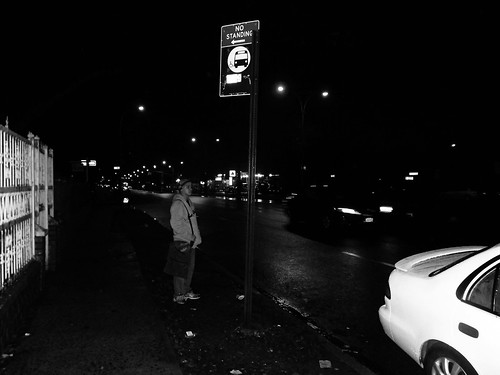Hispanic Immigrants Backed into Poverty
When Maria Bravo left her poor neighborhood in Ecuador for New York City with her two young daughters in 2009, she never imagined she would be leaving one impoverished life for another.
Like many immigrants before her, for years Bravo dreamed of coming to the United States to raise her family. She had heard thousands of stories about the American Dream – immigrants coming to the U.S. and finding a better life in the “land of plenty.” She left behind her job as a store clerk, and arrived in New York prepared to work as much as she needed and to do whatever it took so that her daughters would be cared for. What she was unprepared for was the difficulties she faced finding a job that actually paid enough to support a family in New York City.
“Life of an immigrant in New York isn’t a life, I do not like this life – it is not what I thought it was,” said Bravo, in Spanish, who works more than 60 hours a week at a peanut stand in Rego Park. “[In Ecuador] I may not make the money I can make here. I do not want to be rich, I want to be able to spend time with my family and have enough money to survive.”

Immigrants arrive in the United States and are forced to take low-paying jobs, working long hours and physically exhausting their bodies. Day laborers like this one are generally paid $40 for a day's work.
In New York City, there are currently more than 640,000 Hispanics living in poverty, the highest of any group citywide. The large majority are immigrants from Mexico, Ecuador or the Dominican Republic who come in search of better work, but are instead forced into low-paying jobs.
The root of this issue can be partly attributed to the low levels of education many of these Hispanic immigrants arrive with, according to Dr. Andres Torres, a professor in Latin American and Puerto Rican Studies at Lehman College. That lack of education, in combination with language barriers and the bleak economy, create a perfect storm for Hispanic unemployment.
“The [decline of] good paying jobs is raising the bar for those persons like immigrants who are entering the economy,” said Dr. Torres. “A lot of people, whether they are Latino or not, have been willing to accept positions that they would not normally want to work at with lower wages.” Such factors have restructured the economy and contributed to downward mobility, added Dr. Torres.
Historically, immigrants in the United States have typically found low-skilled jobs upon their arrival. They arrive believing in the ideal of upward mobility – after a few years of hard labor, their hard work will be rewarded and they will obtain a higher-paying position. These low-skilled jobs served as the foundation for building a better life in America, provided the employees learned English, according to Dr. Torres.
However, the current crop of low-skilled jobs is making the lives of immigrants extremely difficult. While long hours and low pay have always been a factor in today’s economy, the money that can be made often barely covers New York’s cost of living. The types of jobs typically available to immigrants – waiting tables, cleaning homes and offices, taking care of children, construction labor – are in such high-demand among this class that the majority bear the conditions for fear of losing the job.
“Immigrants from Latin America are pushed into certain industries because of that lack of level of education, and because they are racialized to think that they are only good for that type of work,” said Andres Garcia, a member of the non-profit organization New Immigrant Community Empowerment (NICE) that helps new immigrants build social, political and economic power in their communities. “A Latino immigrant is more likely than not going to be in the construction or restaurant industry. Those are the two industries that are open to him, due to his lack of status, due to his educational background and due to what society views him as able to do because of his race.”
Pablo Nieto, 27, first arrived in New York City from Colombia in 2010, and spent five months trying to find a job. He was able to get by living with his grandmother in Queens in a rent-controlled apartment, but he nevertheless felt the pressure to find a job immediately. He had family still in Colombia whom he felt obligated to support financially. Nieto emigrated to help pay for his family’s mounting medical bills.

Pablo Nieto makes his way home from work on a Friday night after working a 12-hour shift at a Dallas BBQ in the Bronx.
Unlike many immigrants, he arrived in New York with some education and the ability to speak English. A medical aid in Colombia, he applied tirelessly to multiple hospitals in New York. He received few offers for interviews, each leading to nothing more than a formal meet-and-greet. Nieto grew tired of rejection, and eventually took the one job that extended an offer – working as a bus boy at a Dallas BBQ in the Bronx.
“You arrive thinking life is different because the U.S. is known as a great land, you think you’ll get a job and work and make a lot of money,” said Nieto in Spanish. “But you arrive and you get a job here working harder than what you would in your home country. The money may be greater, but so are the costs.”
Some would argue that more time is needed to reap the benefits of hard work. Upward mobility typically takes place over two or more generations, argues Dr. Torres. Still, when you are trying to live day to day, and struggling to find the funds necessary to survive, time is not a factor that can be afforded.
“They come with the attitude that they will get here, and find a job and that they will be good, but once they get here, reality sinks in,” added Garcia. “They don’t know the language, they don’t have access to the same institutions like everyone else, and they do live a type of second-rate citizenship.”
Read the full story here.
